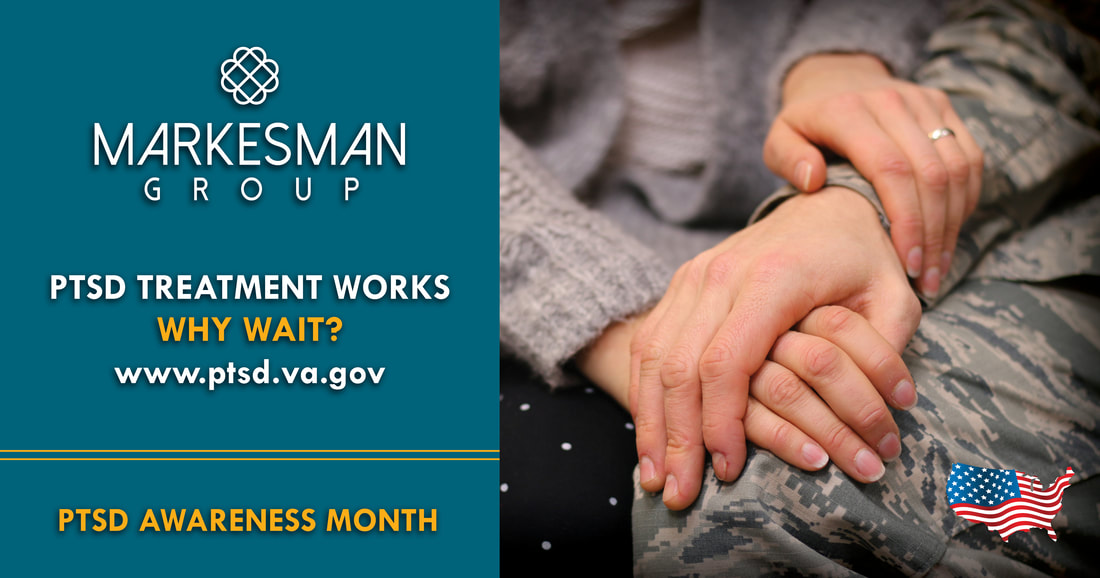|
There are currently about 8 million people in the United States with PTSD PTSD is a mental health disorder that people develop after living through or experiencing a traumatic event such as war, natural disaster, rape, abuse, or an accident. PTSD is diagnosed when symptoms last more than a month and are severe enough to interfere with relationships or work. PTSD can occur in mild to moderate levels; each person is uniquely impacted. Signs of PTSD may begin to show soon after the traumatic event, but some people experience a delayed onset of symptoms. Signs and symptoms of PTSD include:
PTSD symptoms may disrupt a person’s daily routine. People, places, or things that remind a person of the traumatic event can trigger an episode. These symptoms may cause a person to change his or her personal routine. For example, after being attacked by a dog a person may avoid animals or pets altogether. Children may react to traumatic events differently than adults. Some signs that your child may be experiencing PTSD include:
PTSD helplines are widely available and provide free resources for people struggling with related issues such as flashbacks, nightmares, anxiety, anger, substance abuse, and others. PTSD (post-traumatic stress disorder) is a condition that develops when someone is exposed to a shocking, dangerous, or life-threatening event. People experiencing persistent and recurring symptoms can benefit from the guidance provided by a hotline or mental health professional. However, if you or a loved one is in danger of harming yourself or someone else, please call 911 immediately. It can be difficult to pick up the phone and ask for help, but calling a PTSD hotline number is a free and easy way to speak with someone who is knowledgeable about PTSD and the treatment options available. All PTSD hotlines are private and confidential; specialists are trained professionals who can offer guidance and a sympathetic ear. Hotlines are also open to friends and loved ones seeking information and treatment options for someone close to them. Calling a PTSD crisis hotline can help you:
Population surveys show that in the U.S., nearly 4% of men and 10% of women will develop PTSD at some point in their lifetime. Although this is only a small portion of people who have gone through a trauma—about 60% of men and 50% of women experience at least one trauma in their lifetime—this rate of prevalence accounts for about 8 million adults with PTSD in any given year. About 60% of men and 50% of women experience at least one trauma in their lifetime - this rate of prevalence accounts for about 8 million adults with PTSD in any given year. While suffering from PTSD can be an isolating experience, it’s important to know that you are not the only one who feels this way, and there are resources available to help you get back to leading the life you want. PTSD can happen to anyone and is not a sign of weakness. PTSD helplines are a non-judgmental, safe first step in the right direction for receiving treatment. Calling a PTSD hotline number is a great way to get your questions answered in a confidential manner. Often, people are not fully aware of the signs and symptoms of PTSD, nor are they familiar with the best methods of treatment. If someone develops PTSD because of an ongoing source of trauma such as an abusive relationship, they will need help addressing their mental health issues as well as the traumatic environment contributing to them. A good first step is to call a post-traumatic stress disorder helpline. Other associated issues can include panic disorder, chronic depression, substance abuse, and suicidality.2 The purpose of a PTSD hotline is to provide information and connect you to services. Here are some questions you may want to write down before calling a PTSD crisis hotline about your condition:
Family members and friends can feel helpless and lost trying to find help for a loved one. It also may be hard for the actual person struggling with PTSD to ask for help. Friends and family members are often the catalyst that allows someone to receive the critical help they need. It is important to realize that it may take time, but with treatment, your loved one can recover. A post-traumatic stress disorder helpline can help point you in the right direction. It is important to realize that it may take time, but with treatment, your loved one can recover. Here are some questions to ask if you are calling about a loved one’s condition:
NEED HELP RIGHT AWAY? Call 1-800-273-8255 (Press "1" if you are a Veteran.) Chat online with a counselor Call 911 or visit a local emergency room We are a proud Service-Disabled Veteran-Owned Small Business Official V3 Certified Company, and Certified Veterans at Work Business Email Us:
careers@markesman.com Job Opportunities: www.markesman.com/open-positions Follow us on social media: |
MARKESMANLead. Inspire. Dare. Archives
January 2023
Categories
All
|
We are a proud Service-Disabled Veteran-Owned Small Business
Official V3 Certified Company, and Certified Veterans at Work Business
2021 Inc. 5000 #291 Fastest Growing Private Company
Official V3 Certified Company, and Certified Veterans at Work Business
2021 Inc. 5000 #291 Fastest Growing Private Company
LEAD. INSPIRE. DARE.
11817 Canon Blvd, Ste. 610
Newport News, VA 23606
Fax: 757-926-4441
info@markesman.com
11817 Canon Blvd, Ste. 610
Newport News, VA 23606
Fax: 757-926-4441
info@markesman.com
About Us |
Services |
Customers |
Careers |
Make Your Marke |
Contact Us |
Markesman LLC 2022. All Rights Reserved. Privacy Policy













 RSS Feed
RSS Feed
